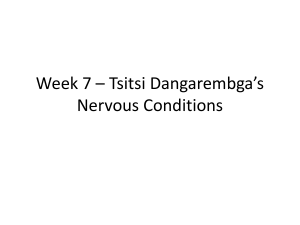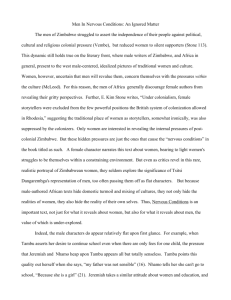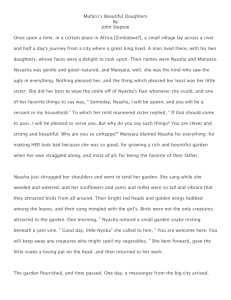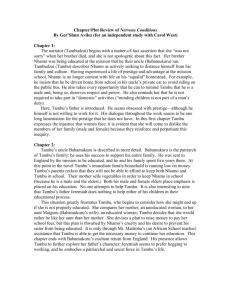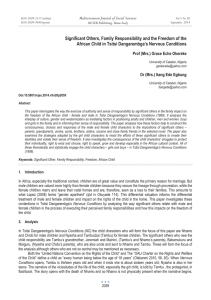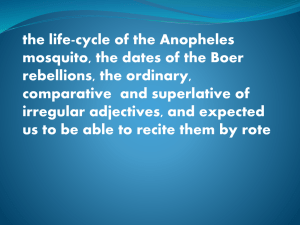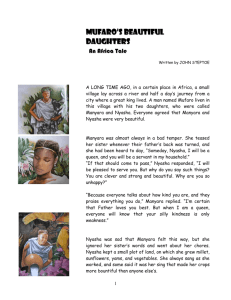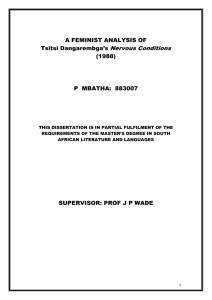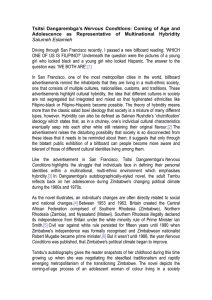Cultural Confusion in Nervous Conditions: Homelessness
advertisement
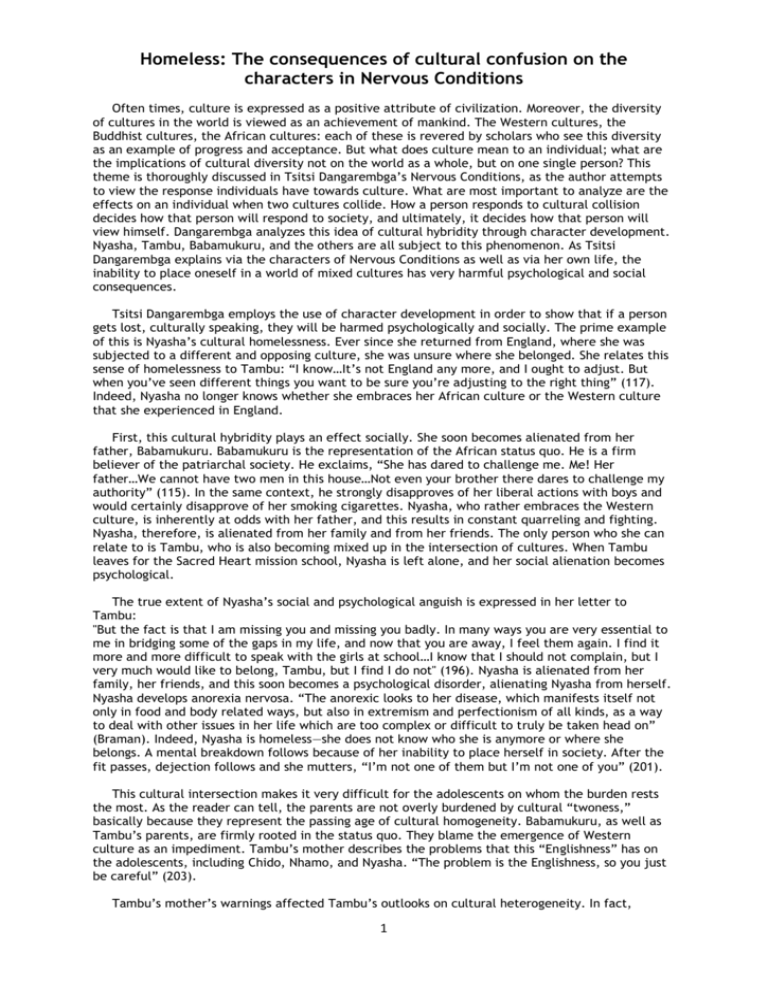
Homeless: The consequences of cultural confusion on the characters in Nervous Conditions Often times, culture is expressed as a positive attribute of civilization. Moreover, the diversity of cultures in the world is viewed as an achievement of mankind. The Western cultures, the Buddhist cultures, the African cultures: each of these is revered by scholars who see this diversity as an example of progress and acceptance. But what does culture mean to an individual; what are the implications of cultural diversity not on the world as a whole, but on one single person? This theme is thoroughly discussed in Tsitsi Dangarembga’s Nervous Conditions, as the author attempts to view the response individuals have towards culture. What are most important to analyze are the effects on an individual when two cultures collide. How a person responds to cultural collision decides how that person will respond to society, and ultimately, it decides how that person will view himself. Dangarembga analyzes this idea of cultural hybridity through character development. Nyasha, Tambu, Babamukuru, and the others are all subject to this phenomenon. As Tsitsi Dangarembga explains via the characters of Nervous Conditions as well as via her own life, the inability to place oneself in a world of mixed cultures has very harmful psychological and social consequences. Tsitsi Dangarembga employs the use of character development in order to show that if a person gets lost, culturally speaking, they will be harmed psychologically and socially. The prime example of this is Nyasha’s cultural homelessness. Ever since she returned from England, where she was subjected to a different and opposing culture, she was unsure where she belonged. She relates this sense of homelessness to Tambu: “I know…It’s not England any more, and I ought to adjust. But when you’ve seen different things you want to be sure you’re adjusting to the right thing” (117). Indeed, Nyasha no longer knows whether she embraces her African culture or the Western culture that she experienced in England. First, this cultural hybridity plays an effect socially. She soon becomes alienated from her father, Babamukuru. Babamukuru is the representation of the African status quo. He is a firm believer of the patriarchal society. He exclaims, “She has dared to challenge me. Me! Her father…We cannot have two men in this house…Not even your brother there dares to challenge my authority” (115). In the same context, he strongly disapproves of her liberal actions with boys and would certainly disapprove of her smoking cigarettes. Nyasha, who rather embraces the Western culture, is inherently at odds with her father, and this results in constant quarreling and fighting. Nyasha, therefore, is alienated from her family and from her friends. The only person who she can relate to is Tambu, who is also becoming mixed up in the intersection of cultures. When Tambu leaves for the Sacred Heart mission school, Nyasha is left alone, and her social alienation becomes psychological. The true extent of Nyasha’s social and psychological anguish is expressed in her letter to Tambu: "But the fact is that I am missing you and missing you badly. In many ways you are very essential to me in bridging some of the gaps in my life, and now that you are away, I feel them again. I find it more and more difficult to speak with the girls at school…I know that I should not complain, but I very much would like to belong, Tambu, but I find I do not" (196). Nyasha is alienated from her family, her friends, and this soon becomes a psychological disorder, alienating Nyasha from herself. Nyasha develops anorexia nervosa. “The anorexic looks to her disease, which manifests itself not only in food and body related ways, but also in extremism and perfectionism of all kinds, as a way to deal with other issues in her life which are too complex or difficult to truly be taken head on” (Braman). Indeed, Nyasha is homeless—she does not know who she is anymore or where she belongs. A mental breakdown follows because of her inability to place herself in society. After the fit passes, dejection follows and she mutters, “I’m not one of them but I’m not one of you” (201). This cultural intersection makes it very difficult for the adolescents on whom the burden rests the most. As the reader can tell, the parents are not overly burdened by cultural “twoness,” basically because they represent the passing age of cultural homogeneity. Babamukuru, as well as Tambu’s parents, are firmly rooted in the status quo. They blame the emergence of Western culture as an impediment. Tambu’s mother describes the problems that this “Englishness” has on the adolescents, including Chido, Nhamo, and Nyasha. “The problem is the Englishness, so you just be careful” (203). Tambu’s mother’s warnings affected Tambu’s outlooks on cultural heterogeneity. In fact, 1 Tambu is able to be a spectator as well as one who is also affected by cultural intersection. From the beginning, Tambu yearns to be educated and to be free of some of the African cultural bindings, but at the same time, she is afraid to lose her sense of Africanism. While she wants to leave the homestead and what it represents, she is frightened by the affects that Western culture has had on Nhamo, who loses his African identity and his ability to speak Shona. Moreover, when Tambu learns that she is to room with Nyasha at the mission, she has mixed feelings. “There was a certain glamour to the idea of sharing a room with my Anglicized cousin…But for all the glamour, the thought persisted that Nyasha would not be good for me. Everything about her spoke of alternatives and possibilities that if considered too deeply would wreak havoc with the neat plan I had laid out for my life” (76). In the end, Tambu does not lose her Africanism. As a spectator, she sees that cultural alienation can have disastrous results. She has the privilege of seeing how those results play out on her cousin and her brother. For this very reason, she eventually (although at first subconsciously) heeds her mother’s warnings about Anglicanization: "I was young then and able to banish things, but seeds do grow. Although I was not aware of it then, no longer could I accept Sacred Heart and what it represented as a sunrise on my horizon. Quietly, unobtrusively and extremely fitfully, something in my mind began to assert itself, to question things and refuse to be brainwashed, bringing me to this time when I can set down this story" (203-4). If Tambu did not have the opportunity to see the effects of cultural hybridity, she would certainly have followed the path of Nyasha and her brother. Since Nervous Conditions is a quasi-autobiographical work, where Tambu represents the adolescent Dangarembga, it can be seen that neither Tambu nor Dangarembga succumb to the problems of cultural delineation. Tambu refuses to follow Nyasha’s footsteps to certain psychological and cultural disaster, and in this same way, Dangarembga makes sure she is not destroyed by these problems. It can be seen in Dangarembga’s life that even though as a child she forgot Shona and became slightly Anglicanized, she returned to Rhodesia and relearned Shona. Her attachment to Africa makes it obvious that she refuses to succumb to the cultural mix that created cultural confusion among many adolescents of the time. She has even stated that “My soul is African…it is from there that springs the fountain of my creative being.” Even though Danbarembga remains true to her African heritage, it must be noted that she is a reformist as well. She does not agree with the patriarchal and restrictive culture that is found in Nervous Conditions. But while she would appreciate change, she does not agree with an overtake by the Western culture. It is exactly this that she stresses in the novel: while it is important to accept change, one must never forget heritage and roots. She argues this point because cultural hybridity is dangerous for an individual, as can be seen in Nyasha’s case. “Cultural hybridity causes the individual to be pulled in multiple directions, adopting identities which may differ from one another….The 'nervous condition' is understood as explaining the position of the native who feels as though she or he occupies multiple identities, some of which contradict other identities” (Eslamieh). Dangarembga uses her knowledge and experiences to keep from being torn apart. It is thus no wonder that she studied psychology at the University of Zimbabwe. And indeed this structural outlook that is found in her life and in the novel is central to her theme. Like many black women writers, she uses the individual to express her concern of cultural confusion. “The cultural mirror held up to black girls produces a profound sense of Otherness…black women fiction writers vividly describe girls' discovery of this Otherness; it is central to their heroines' coming of age” (Backes 148). Homelessness, in a cultural sense, can be devastating to an individual. Everyone needs to be placed somewhere or otherwise alienation will result, and the social and psychological aspects of a person’s life will be ruined. Nyasha, Chido, and Nhamo all fell victim to this cultural hybridity, and Tambu would have done the same had she not witnessed the effects first-hand. Dangarembga survived the cultural dichotomy that was effecting the adolescents of Rhodesia/Zimbabwe only be heeding the axiom that she later wrote about in Nervous Conditions. As Jean-Paul Sartre wrote in his introduction to Franz Fanon’s The Wretched of the Earth, “The condition of a native is a nervous condition.” A native, when subject to an invasion in which neither his culture nor the colonial culture is seen to be positive, tends to be confused, to be lost. What he develops is a nervous condition. And that nervous condition is the feeling of being homeless, where no place feels just right. 2
